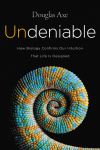Douglas Axe wants to save you. For him, the most important question a person can ask is “To what or whom do we owe our existence?” Answer incorrectly, and the consequences are terrible to imagine:
Contemplate for just a moment the dystopian vision of a generation of human beings believing in their hearts that they are nothing more than bestial accidents fending for themselves in a world where morality is a fiction, and you begin to grasp the true stakes.
When I’m giving a Bio 101 lecture on the evolutionary divergence between clams and snails, it does not occur to me that so much is on the line. But for Axe—a molecular biologist and director of The Biologic Institute, an organization that promotes intelligent design theory—a great deal hangs in the balance. Axe believes that evolutionary science leads many bright young people to abandon what he calls their “innate design intuition” in favor of a mistaken worldview that “robs life of all hope and meaning.” What evolutionary biology causes people to forget, Axe writes, is that “we owe our existence to the personal God who understands our existence.”

Undeniable: How Biology Confirms Our Intuition That Life Is Designed
Douglas Axe
HarperCollins, July 2016
According to Axe, “Heroes are badly needed” who will take on “the privilege of defending the very possibility of virtue.” Axe clearly sees himself as one of those heroes, and he has written Undeniable to equip his readers to become such heroes in their own right. “To stand your ground in the face of…intellectual intimidation, you would need a simple, unassailable commonsense argument,” he tells his would-be warriors. Hence, this book.
It takes chutzpah to give a book the title Undeniable—exceeding even Daniel Dennett’s eyebrow-raising Consciousness Explained.* But on the cover of this thinly-substantiated polemic, the word seems particularly ill-placed.
Axe opens with an interesting finding from social psychology: people tend to intuit that living organisms are designed until they are taught otherwise. Faced with a fish, a child will tend to believe that an intelligent being designed the fish.
Axe’s main argument is that life is too complicated to have arisen by chance. Given how many ways there are to arrange Legos randomly, and given how few of those random Lego arrangements would form a functional figure like Hogwarts or the Millennium Falcon, the chance of something like the Millennium Falcon randomly evolving from a bunch of Legos is so infinitesimally small that it is effectively impossible.
Similarly, given how many ways an average protein could be arranged if just randomly assembled from its parts, and given how few of those randomly-assembled variants would actually function, no functional protein could have evolved by random chance. And if a protein—a complex molecule, but just a molecule nonetheless—could not have evolved by chance, then an entity as complex as a cell could certainly not have evolved, let alone an organism.
All of this leads up to Axe’s main and final point, when he makes a jump from biology to metaphysics: because life could not have evolved by chance, all living beings must have been created by an intelligent, personal God. People tend to intuit that living organisms are designed by a God-like designer, and the scientific evidence corroborates this intuition. “The children were right after all,” he sighs.
Studies from social psychology really do suggest that people’s pre-theoretical assumptions about living organisms are that they were designed for something. But none of this suggests that our pre-theoretical assumptions are better than the assumptions we hold after we learn a theory. Intuitively, we also might observe that the Earth is flat, stationary, and orbited by the Sun. But we do not depend on this “geophysical intuition” to navigate airplanes, or to explain how it can be summer in Canada and winter in Australia. Many scientific theories—including evolutionary theory—are counter-intuitive, but this is why they are interesting, useful, surprising, and even awe-inspiring.
Though design intuition may exist, this is hardly evidence for the existence of an intelligent designer. Axe, to his credit, admits this, so he builds up his main argument, the one about proteins, with analogy after analogy. He calculates the chances of getting a portrait of Abe Lincoln from randomly arranged pixels, the chances of getting a Shakespearean sonnet from randomly arranged words, the chances of finding this exact spot with a randomly dropped pin, and so on.
Undeniable could have been compressed into an article, but it is bulked up by the same argument made repeatedly, as if hoping that the point will become more convincing through repetition.
What is remarkable is not even how many times Axe repeats the same argument, but how many times this same argument has been repeated by intelligent design (ID) proponents before him. The “small probability of a protein evolving by chance” argument is standard creationist fare, and it has been refuted convincingly over and again since at least the days when pro- and anti-IDers had to dial in over modems to argue with each other in alt-newsgroups.
What makes the argument misleading—however often it’s repeated—is that ID proponents wildly deflate the probability of getting a functional protein through unguided processes. They take an existing protein, count how many components—amino acid residues—it has, and ask, “What are the odds that this protein evolved by chance, i.e. by any of the residues being filled by any one of the 20 amino acids?”
This is analogous to a computer playing a particularly unmerciful version of Hangman. What are the chances that a computer randomly assigning letters to spaces would guess a 100-letter sentence correctly on the first try? The chances are pretty darn low. But evolution is more forgiving than that. Getting all 100 residues in their exact order is usually not necessary for a protein to function—often, the majority can be substituted for other residues. It’s as if our computer only had to get the vowels completely correct, but could substitute consonants for each other. More importantly, for Hangman to be more like an evolutionary process, the computer would get many trials—not just one-and-done—and would also get feedback.
Evolution is a historical process, where each step depends on the prior step, not a one-time jackpot against unlucky odds.
Why would Axe place the same tired, often-refuted argument as the centerpiece of his book? He clearly isn’t trying to win over biologists. Undeniable is a book for believers—those who are already troubled in some way by evolutionary theory and the perceived threat it poses to the origin of life from God. He calls this audience together conspiratorially, creating a wise us and a deluded them.
“If you and I really are after the truth, we can’t follow them,” Axe tells his readers. “You and I may be repelled by the food on their plates [i.e. evolutionary explanation], having reasoned that it robs life of all hope and meaning, but that’s only because we take these implications far more seriously than they do.”
Undeniable is intelligently designed in this way. It manages to be both sincere—Axe clearly believes in his cause—and strategic, in that it’s carefully constructed to convey to his audience this sense of righteousness. Axe aims to give these believers the tools they need to win arguments against those who bypass God in order to explain the origin of life.
The technical arguments are not the point of Axe’s book, nor have they ever been the point of ID in general. Critics often try to refute IDers like Axe by presenting ever-mounting data in favor of evolutionary theory. But they find themselves facing a moving target. Even if he could be convinced that evolutionary theory is correct, and that “life unfolded from the initial conditions of the universe or the laws of physics,” Axe would still see life as evidence of a Creator, because only God could have made our cosmos “so ingeniously life-directed.”
This is something of a bait-and-switch: it turns out that Undeniable is not about evolutionary biology after all. No amount of data from evolutionary biology—or from any scientific field—could change Axe’s ultimate claim: that “we owe our existence to a personal God.”
That Axe’s argument has little relationship to particular scientific details does not mean that I’m accusing him of being somehow immune to all empirical evidence or all reason. Rather, another type of reasoning is at play here: modern humans are plagued by meaninglessness and alienation; this alienation is due to the rise of atheism and atheistic explanations of human life and origins; and therefore the end of atheism and the rise of theism will mark the end of meaninglessness and alienation. It is this line of reasoning—about the causes of suffering and salvation—that gets to what is actually at stake.
Axe genuinely believes that by writing a pseudo-technical book on proteins, he is defending the Very Possibility of Virtue and saving Western Civilization. This is, needless to say, a bold premise, but it’s also very much in keeping with the spirit of our times.
Practically every Hollywood movie seems to involve a hero swooping in to save the day against vast and uncertain odds. More importantly, every movie creates a situation where all problems, however daunting or complex, meet at a single point. The Death Star is formidable and impossibly well-defended, but a single laser directed at its vulnerable heart will bring the whole complex down. Scale a problem down, make it smaller and smaller and smaller, and you finally have a point of leverage that can be acted upon by a single, special individual—a hero.
Saving people from literal death and destruction might be easier than the task that evangelists like Axe have taken on: to save people from their own minds, from the internal havoc of meaninglessness, despair, and alienation. Where is the point of leverage for that situation; the button that a hero could push to save us from ourselves? Axe’s answer to this question is strangely specific: that this point of leverage is a small, unremarkable button marked “God made proteins.”
But salvation is not such a cheap, glib thing. Those who are serious about salvation are serious about creating the conditions of genuine ease and assurance for others in the face of their deepest terrors and despairs. What this requires is much more difficult, interesting, and rewarding than trying to win the same tired arguments about the structure of molecules.
What is needed, for theists and atheists alike, is more space to be listened to, more people to whom we can tell the truth: that we sometimes worry about the finiteness and meaning of our lives; that our losses and disappointments take their toll on us; that we are sometimes lonely and afraid and full of doubt in the face of death and the wholly unknown; and that we sometimes want someone who can help, someone to reassure us our bodies and minds and world completely transform, and maybe utterly dissolve.
Who is that person? For Axe, as for many others, the heroic savior is a strong man who admits no fear or uncertainty. He is powerful. He knows what he’s doing. He will carry you out of the burning building of your own fear and pain and get you home safely.
Despite Axe’s passionate call-to-action, heroes are actually not badly needed. But friends are. Good friends don’t need to be particularly heroic, pious, smart, strong, or good. They’re not free of fear or uncertainty. Rather, they’re just attentive enough to their own fears and uncertainties to support others who are facing the same. Unlike the savior-evangelist, the good friend trusts you to be able to courageously face your own mind, with its own specific flavors of terror and despair.
It’s this kind of down-to-earth, genuine curiosity about others that may go a surprisingly long way in helping them, and ourselves.
Douglas Axe is a man with a purpose, one that he has manifested by writing Undeniable. In trying to save a generation from meaninglessness and alienation, he may feel that he has saved himself from the same. But this book and its proponents can’t save those of us who don’t believe that salvation is as simple as answering one question correctly.
*Correction: This piece originally stated that Daniel Dennett is the author of How the Mind Works. That title also requires a lot of chutzpah, but its author is Steven Pinker, not Dennett. The audaciously-titled Dennett book is Consciousness Explained.
Also on The Cubit: How not to defend atheism
Follow The Cubit, RD’s religion-and-science portal, @TheCubit





